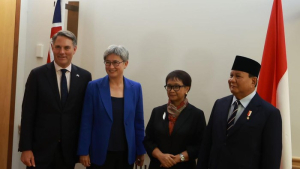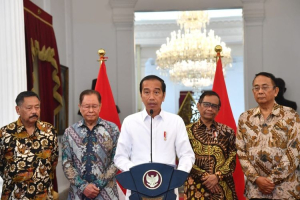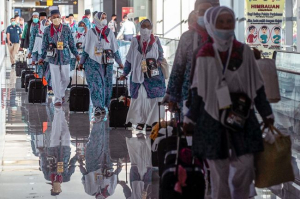Indonesia, North Korea see declining trade relations
Indonesia and North Korea have seen a continuously declining trend in bilateral trades although both countries had a blossoming diplomatic relations during the Cold War. During Indonesia's First President Sukarno era, trade between the two countries had flourished and has been ongoing even until this day.
Diplomatic relations between both countries have existed since 1961, as North Korea also attended the Games of the New Emerging Forces (Ganefo) in Jakarta two years later. Sukarno's close relationship with North Korean leader Kim Il-sung was proven by the opening of embassies of both countries.
However, the diplomatic ties of both countries have turned sour in recent years due to North Korea's nuclear weapon program and international sanctions against the country. A survey by the BBC World Service Poll in 2017 saw 46% Indonesians viewed North Korea's influence negatively, with only 17% expressing a positive view.
Despite this, Indonesia still maintains diplomatic relations with North Korea and has called for a peaceful resolution on the ongoing tensions between the country and the international community. Both countries have limited their cooperations in several areas such as trade, culture and sports due to the sanctions.
Declining trades on both sides
According to data from the Statistics Indonesia (BPS), trade between the two countries has been steadily decreasing in recent years. In 2016, trade between Indonesia and North Korea was valued at US$ 4.7 million, but this decreased to US$ 3.8 million in 2017 and US$ 3.3 million in 2018. In 2019, trade between both countries further dropped to US$ 1.5 million.
In 2020, Indonesia shipped a mere US$ 294 worth of goods to North Korea, mainly other rubber products. Over the last 25 years, Indonesia's exports to North Korea have been decreasing at an average rate of 32.5% per year, from US$ 5.4 million in 1995 to US$ 294 in 2020.
Meanwhile, North Korea shipped US$ 731,000 worth of goods to Indonesia, primarily raw zinc (US$ 303,000), Propylene Polymers (US$ 286,000) and pile fabric (US$ 45,600), according to data from oec.world. Over the last 25 years, North Korea's exports to Indonesia have been decreasing at an average rate of 13.3% per year, from US$ 25.6 million in 1995 to US$ 731,000 in 2020.
Sanctions contribute to declining trade
The international sanctions imposed on North Korea have made it difficult for Indonesian businesses to trade with the country, thus causing a decline in trade. The sanctions have also limited the types of goods that both countries can trade. This has affected the bilateral trade balance as well, with Indonesia's exports to North Korea being much higher than its imports from North Korea.
In addition, the Indonesian government has also implemented stricter regulations and guidelines for businesses to comply with the UN sanctions, which has further restricted trade between the two countries.
Already have an account? Sign In
-
Start reading
Freemium
-
Monthly Subscription
30% OFF$26.03
$37.19/MonthCancel anytime
This offer is open to all new subscribers!
Subscribe now -
Yearly Subscription
33% OFF$228.13
$340.5/YearCancel anytime
This offer is open to all new subscribers!
Subscribe now






